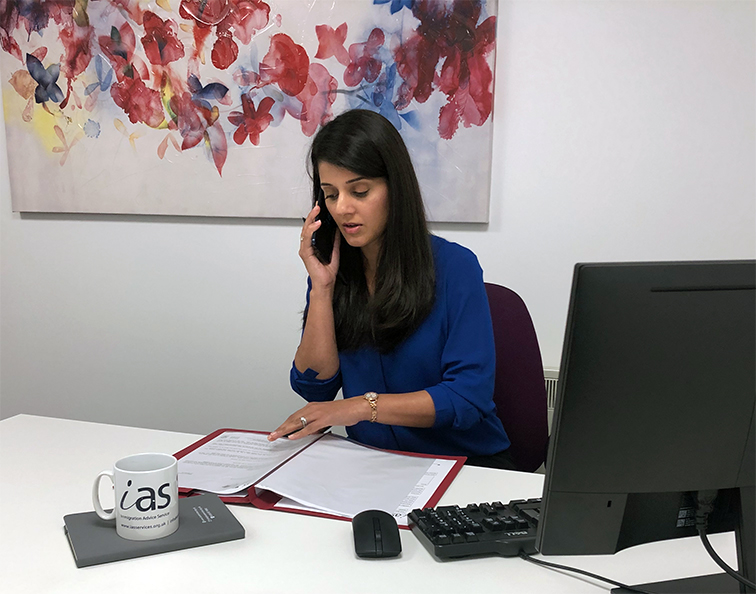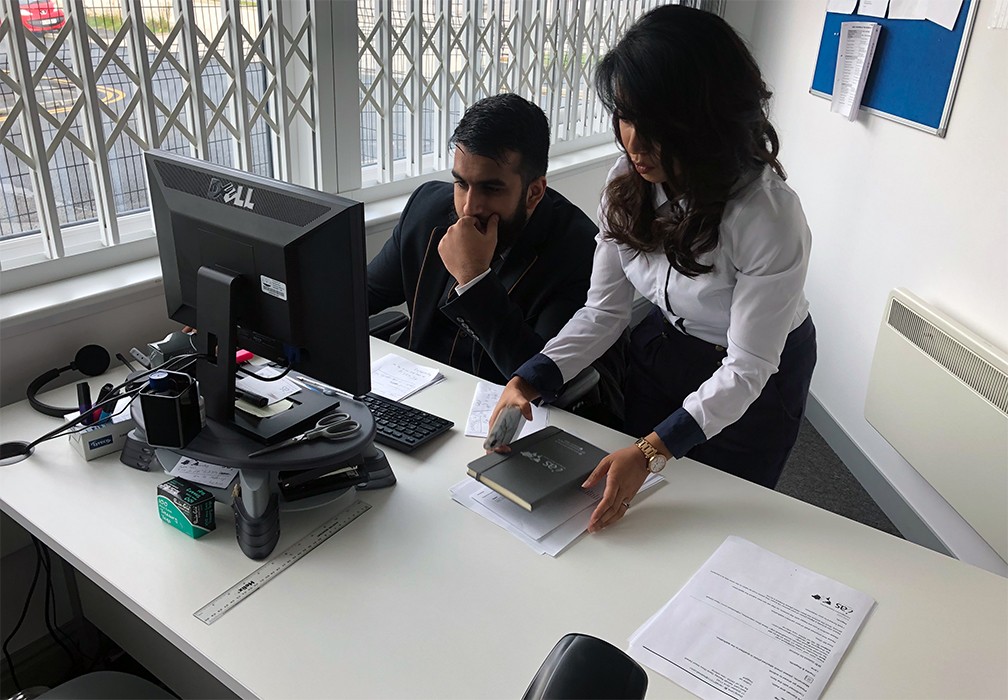Can You Claim Asylum In The UK For LGBT Reasons?
While the world is more open and accepting of the LGBTQIA+ community, not everywhere is so accepting, and there are plenty who have a well-founded fear of persecution based on their sexual orientation.
Thankfully, those who fear persecution for their sexuality can seek gay asylum in UK territories. No matter your sexual orientation or gender identity, the UK has the potential to be a safe place. However, asylum claims are complex, and it can be beneficial to seek legal advice. Here at Total Law, we can help those seeking asylum. Just give us a call at 0333 305 9375 to get started.
Can You Claim Asylum In The UK For LGBT Reasons?
An area of UK human rights law that has a particular focus is the fear of lesbian, gay, bisexual, and transgender asylum seekers. LGBT people and asylum seekers mark the individual narratives around courage, resistance, distress, and the global dialogues that surround sexuality, identity, and human rights.
The United Kingdom is one of the most celebrated nations for its more progressive policies regarding LGBTQIA+ rights. As such, it has become a place of refuge for those who are escaping persecution based on their gender identity or sexual orientation.
Yet, making this journey to acceptance and safety is not easy. Home Office views on LGBT asylum claims are a topic that is hotly debated and has stirred up controversy over many years.
Asylum applications in the UK are not always easy. However, those in same-sex relationships who have a justifiable fear of inhuman and degrading treatment in their origin countries and who can provide substantial supporting evidence find success in asylum cases in the UK.
This means that while it is possible to claim asylum in the UK for LGBT safety, it is critical to understand how the process works and the challenges that can be faced.
Those who apply to get LGBT asylum can get refugee status. Those who are fleeing persecution in their countries, which could result in physical harm, threats, or restrictions on freedom in their home countries, where trans identity or homosexuality might be criminalised, socially unaccepted, or stigmatised.
Page Contents
- Can You Claim Asylum In The UK For LGBT Reasons?
- What Documents And Evidence Do I Need To Make An Asylum Claim?
- How To Apply For Asylum In The UK
- What Happens While Awaiting Decision On Your Asylum Claim
- What To Do If Your Asylum Claim Is Denied
- Our Total Law Immigration Solicitors Can Help Your Asylum Claim
- Frequently Asked Questions
Why LGBT Individuals Seek Asylum
Those who leave their origin countries to seek asylum in a new country can be a matter of service and a critical necessity to be able to evade oppression.
Some of the reasons that a person may seek asylum include:
Government-Endorsed Oppression
LGBT identities can be proscribed in numerous countries across the globe, with deviations from heteronormative norms met with extreme penalization. Government-endorsed oppression can manifest in many different forms; it can range from the criminalization of homosexuality to laws that constrain the free expression of gender identity.
Rejection By Community & Family
Many LGBT individuals find that oppression starts at home. For these people, hardships from family and community can result in abuse. The absence of support systems increases LGBT challenges.
Denial Of Rights & Services
In many places, the LGBT community is denied basic services and rights. This can go as far as the refusal of healthcare and discrimination from employment and housing. These institutional injustices deteriorate the quality of life for these people.
Laws Against LGBT Individuals
LGBT individuals often come from places where laws and policies openly undermine their rights and identities. These may include laws against the ‘propagation of unconventional sexual relationships’ and laws that could limit the freedom of assembly or the associations for the LGBTQIA+ community.
Environments like these pose a risk to the incessant menace to their safety and well-being, which causes an increase in the decision to seek asylum in the UK.

What Documents And Evidence Do I Need To Make An Asylum Claim?
The documents and evidence required for an asylum claim can depend on what type of claim is being made.
The initial asylum interview with the Home Office is known as a screening interview. It is important to be honest and tell your interviewer everything. Inconsistencies on an application can result in the application being ‘inadmissible’.
The screening interview will require you to provide the following documents:
- Passports belonging to the applicant and their family.
- The travel documents.
- The ID documents establish ID and nationality, for example, birth and marriage certificates, ID cards, or driving licences.
- Documentation of previous asylum claims.
- Proof of countries of previous residence.
- Medical evidence.
- Other documents that could help your application.
The interviewer will then issue the applicant an ARC (Application Registration Card).
After this interview, the Home Office will process everything from the screening interview, and a substantive interview will be next.
The substantive interview can last 6 hours, as the interviewer will ask you in-depth questions about the applicant’s history and the reasons for claiming asylum. It is important to provide the interviewer with evidence that supports their claims.
Documents necessary for this interview include:
- The applicant’s ARC (Application Registration Card).
- Passport and travel documents.
- Proof of address.
- Birth certificate.
- Evidence that may support the claim.
The documents that are considered evidence vary. Providing evidence is critical, but it is very challenging. The Home Office does need it, and it can support your case if you have evidence that defends your story.
Evidence that can aid an application includes documentation such as warrants for an arrest and newspaper articles about oneself or those like oneself who are also being persecuted.
Regardless of the type of evidence provided, the applicant must ensure that the evidence is factually correct and that the documented evidence is genuine. All evidence should be obtained from a reputable source, and it is also important that the applicant show the Home Office how they received the evidence.
This means any evidence posted to the applicant will require the postage to be kept and shown during the interview.
There is a lot of scepticism regarding evidence from outside of the UK in the Home Office. It can be very helpful to have evidence translated by a translator who is certified. If the Home Office does not believe that the evidence is legitimate, then it could have a bad impact on the asylum claim.
How To Apply For Asylum In The UK
An applicant can apply for asylum upon arrival in the UK or after having already entered the country. However, it is best to apply upon entry, as in some cases the Home Office can view an asylum claim not made with immediacy as being disingenuous.
To apply for asylum, the claim must be registered at the screening interview, which is a meeting between the asylum seeker and an immigration officer where the asylum seeker informs them about their case.
Those who claim asylum upon arrival in the UK will have the screening interview conducted at the UK border. At the screening interview, the applicant should expect:
- To be photographed.
- To have their fingerprints taken.
- To have an interview that checks identity and nationality.
After this, the applicant will then be asked why they wish to claim asylum. It is recommended to bring written evidence along to support the claim if possible.
Those who are screened at the UK border will need to tell a Border Force officer that they wish to seek asylum. After this, the claim will be registered and the applicant screened.
Those who are screened in the UK need to call the asylum intake unit; they will call you back and ask simple questions regarding you and any dependents applying with you. Applicants are not asked questions regarding the reasoning for their claim during this phone call.
It is necessary to bring all documents needed to the screening interview, and any dependents who are claiming asylum with the applicant will also need to attend.
After the screening interview, the Home Office will consider the asylum application and decide if it can be considered in the UK. At this point, the applicant should receive an ARC at their UK address.
It is also possible that the applicant may receive an asylum questionnaire. Should this be received, the applicant should fill it in and return it by the deadline noted on the letter.
At a later date, the Home Office will contact the applicant about their claim. If the case can be considered, it will be handed over to a caseworker; if the case cannot be considered, the applicant will be sent to a safe country that will consider the claim.
An applicant for asylum may be sent to a safe country if they have travelled through a third safe country to get to the UK or if they have a connection with another country that they would obtain asylum in.
A safe country fulfils the following criteria:
- The applicant is not a citizen of this country.
- The applicant will not be harmed in this country.
- This country will not send the applicant to another country where they would be harmed.
What Happens While Awaiting Decision On Your Asylum Claim
While awaiting a decision on your asylum claim, you will have an ARC, which will show that you have applied for asylum in the UK. This can be used to do the following:
- Show your identity.
- Show if you have permission to work or not.
- Acquire education and health services.
If an applicant does not have their ARC, they need to contact the Home Office, which could be due to many reasons, such as:
- The ARC has not arrived in the mail.
- The ARC has been lost.
- The ARC has been stolen.
- It has expired.
During the asylum process in the UK, the applicant will be able to do things depending on their case type. Those who are detained while they wait on a decision may be released if they obtain permission to stay in the UK, or they may be held until they are removed from the UK if they do not obtain permission to stay.
Those who are not detained while they wait for a decision are not able to work in the UK, although it is possible to apply for permission to work if you can carry out a job on the shortage occupations list.
Applicants may be able to use educational services. While it is not possible for an applicant to do any study course in the UK, asylum seekers can seek out a course provided as a university scholarship.
Asylum seekers will also get financial and housing support where requested and applicable. Asylum seekers must inform the immigration officer in their screening interview if they will require financial and housing support in the UK. Many organisations in the UK provide asylum support, and the interviewer at the screening interview can arrange support from these organisations.
What To Do If Your Asylum Claim Is Denied
If your asylum claims are denied by the Home Office, then this means that the UK government does not view you as qualifying for refugee status. It is possible to appeal against this decision, however.
It is possible to appeal to a First-Tier Tribunal if this is allowed in your case. Upon rejection of an asylum claim, the applicant will be informed if they can appeal this decision.
How an appeal is conducted is the same whether you are applying to appeal from inside or outside the UK; however, those who are appealing from outside the UK will have 28 days to make their appeal after receiving the decision. However, those appealing from inside the UK will have 14 days to make their appeal after receiving the decision.
Should you choose to appeal the decision on your claim, it is best to seek out expert advice from an immigration lawyer or get legal representation, as it can aid your case.

Our Total Law Immigration Solicitors Can Help Your Asylum Claim
Although the world as a whole may be progressively becoming more open-minded regarding the LGBTQIA+ community, not every country has a shared political opinion on this particular social group. Many LGBT individuals have such a fear of serious harm in their home countries.
Those who come to the UK with an asylum case for safety in such cases can be at real risk of harm and need protection. Here at Total Law, our legal team is versed in dealing with asylum claims and can help individuals with their asylum interviews, making their applications, and making an appeal.
We can also help those who wish to apply for permission to work in the UK, where they may be awaiting a decision and are eligible to fill a role on the shortage occupations list.
Give us a call at Total Law today and speak to one of our team members at
Advice Package
Comprehensive immigration advice tailored to your circumstances and goals.
Application Package
Designed to make your visa application as smooth and stress-free as possible.
Fast Track Package
Premium application service that ensures your visa application is submitted to meet your deadline.
Appeal Package
Ensure you have the greatest chance of a successful appeal. We will represent you in any case.

The Advice Package
During this untimed Advice Session with our professional immigration lawyers in London, you will receive our comprehensive advice, completely tailored to your needs and your situation.

The Application Package
With our Application Package, your dedicated immigration lawyer will advise you on your application process and eligibility. Your caseworker will then complete and submit your forms to the Home Office on your behalf.

The Fast Track Package
Our Fast-Track Application Package is a premium service for those who need to submit their application in time with their deadlines. Your case will become a top priority for our lawyers and you will benefit from our highest-quality services.

The Appeal Package
By choosing our Appeal Package, you can rely on our lawyers’ legal knowledge and experience to ensure you have the highest chance of a successful appeal. We will also fully represent you in any hearings/tribunals.
Frequently Asked Questions
Asylum seekers are not generally permitted to work in the UK, however if their asylum case has been pending for over 12 months then they may be permitted to acquire a job on the UK shortage occupation list.


